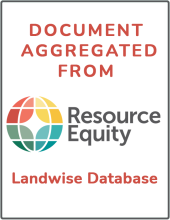Land Library
Welcome to the Land Portal Library. Explore our vast collection of open-access resources (over 74,000) including reports, journal articles, research papers, peer-reviewed publications, legal documents, videos and much more.
/ library resources
Showing items 1 through 9 of 140."... Based on a global model of supply and demand for food and water, this report shows that if current water policies continue, farmers will indeed find it difficult to meet the world’s food needs. Hardest hit will be the world’s poorest people.
"Agricultural research has greatly increased the yields of important staple food crops, and for many people this has meant more food availability and trade opportunities. Yet many people in rural areas in developing countries still live in abject poverty.
Governments are now shifting their role from direct management of irrigation systems to regulation of the water sector, provision of support services to water user associations, and capacity building among water user associations and irrigation service providers....
This report focuses on the sustainability of pastoralism in the lowlands of the Great Rift of East Africa and the Horn, arguing that pastoralism as a mode of production and a way of life has entered a phase of decline, often accompanied by conflict, drought, famine and flooding.The report details
This document presents the key findings of the evaluation of an integrated agricultural production and water management project implemented by IFAD in Netrakona district, in northern Bangladesh.
This book, prepared by the Philippine Environmental Governance Project, serves as a reference guide for field personnel in guiding communities, investors, local government units, private persons and other organisations desiring to apply for tenure instruments on forest lands.The book covers all e
Water governance in the Philippines is saddled by several problems.
This paper examines how, over the past 10 years, Kyrgyzstan has privatised most of its agricultural land and distributed it to individual households. These households either farm alone or join together and farm cooperatively.



